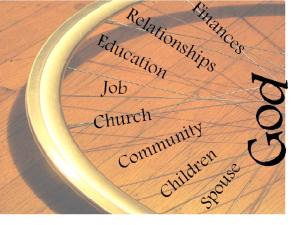So who wants to be a disciple of Jesus? He certainly doesn’t pull any punches about what it takes. First, “Hate your father and mother, wife and children, brothers and sisters, yes, and even life itself.” Second, “Carry the cross and follow [him].” Lastly, “Give up all your possessions.” (See Luke 14:25-33, Proper 18C)
It’s that simple and it’s that difficult. Jesus’ words don’t just sound black and white. They are black and white. It is all or nothing. We are either in or we are out. His words are likely not the first thing that comes to mind when we consider our faithfulness or what the Christian life looks like. We don’t often talk about the demands and sacrifices required by the Christian path. Too often we turn Christianity into a set of beliefs divorced from a way of being and acting.
I’m not talking about salvation, the future, heaven or hell. This is about who we are and how we live right now, here, today. So what do we do with today’s gospel, this so called “good news?” I suspect the first temptation is to soften the text, to explain it away, to reinterpret it to fit our lives. That temptation, however, is just another symptom of the consumerism that infects much of our society, church, and faith.

Too often church and faith are treated like a big buffet. We take as much of what we like and want but leave behind what we do not like, what’s too hard to swallow, what we disagree with, or what does not fit our personal opinions and beliefs. That’s not how the gospels portray Jesus or the life of discipleship. To the degree we have done that we have deceived ourselves and each other.
Sometimes we need to have demands and expectations placed upon us. Good parents know this. “You need to eat it because its good for you.” “You need to do this or that because it’s the right thing to do.” “I expect you to study hard and do your homework, make good friends, do your chores.” They demand and expect out of love so that their child might grow and thrive. That’s what Jesus is doing in today’s gospel. His demands and expectations call us to be different, to be fully alive, to be like him. It is the same choice Moses set before the Israelites, the choice between life and prospretity, and death and adversity (Deuteronomy 30:15-20). It is a choice we make multiple times a day, every day of our lives. That’s the choice with which Jesus confronts the crowds in today’s gospel.
The crowds have been gathering around Jesus since early in his ministry. Jesus was the new buffet for them. He offered healing, exorcisms, teaching, hope, life, good news, bread, freedom, and a new vision. He had what they wanted and they gathered around, surrounded, and pressed in on him. It was as if they could not get enough. The crowds grew in numbers, increasing by the thousands. Something changes, however, with today’s gospel. They are no longer just gathering when Jesus is around; they are now traveling with him.
There is more to discipleship, however, than simply traveling with Jesus. Discipleship is more than grazing at the buffet of divine life. That life cannot be bought but it will cost us everything we have. Hate your family and your own life. Carry the cross. Give up your possessions.
Those three things, the cost of discipleship, shaped Jesus’ own life and ministry. They are to shape ours as well. Jesus is not asking us to do anything he did not do. To the contrary he makes it possible for us to do what he did.
So how did Jesus hate his parents? Remember the twelve year old Jesus at the temple in Jerusalem? Mary and Joseph are frantic looking for him. They think he is lost. When they find him Mary asks, “‘Child, why have you treated us like this? Look, your father and I have been searching for you in great anxiety.’ He said to them, ‘Why were you searching for me? Did you not know that I must be in my Father’s house’” (Luke 3:41-50)? In that moment Jesus hates Mary and Joseph. He set his relationship with them below his relationship with God the Father. This is not the emotional, feeling based way we tend to think of hate today. For Jesus, hating another is about reordering relationships and loyalty. Jesus is not rejecting Mary and Joseph or their love and presence in his life. This is not about rejection but establishing new priorities. For the disciple no one and no relationship can take precedence over the relationship with Jesus; not father and mother, wife and children, brothers and sisters, or life itself.
In that sense Jesus hated his own life. He carried his cross and gave precedence to his Father’s will and our salvation. Again it is about priorities. He set aside his will and preferences in favor of love for and obedience to God.
What about Jesus’ possessions? The birds and animals of this world have more possessions than Jesus. “Foxes have holes, and birds of the air have nests; but the Son of Man has nowhere to lay his head,” Jesus says (Luke 9:58). Again, Jesus is give primacy to his relationship with God not his relationship with things. It’s a question of priorities.
Jesus is asking us to do and be what he did and who he was. That’s what a disciple is. A disciple is a learner, one who learns to live, act, speak, and think like the teacher. The disciple integrates the teacher’s life and teachings into his or her own life.
No one, no cost, no thing is to take precedence over or interfere with our relationship with Jesus. Nothing is more important because it is our relationship with Jesus that shapes, defines, determines, and characterizes all our other relationships, all other aspects of our lives, who we are, what we say, and what we do.
Discipleship, learning to be and live like Jesus, is ultimately what unifies our life. So often we live fragmented and compartmentalized lives. We have a work life, school life, family and home life, internet life, recreational life, political and civic life, church life. This fragmentation allows us to place each of those different aspects of our life as the priority depending on where we are, who we are with, and what we are doing. That fragmentation is one more symptom of a consumer oriented, buffet driven world.
Jesus’ demands and expectations change all that. There can be only one priority and it is to inform and shape the whole of who we are and what we do. Think about some of the implications.
- It means we are to be the same person with the same values, principles, and beliefs regardless of where we are, who we are with, or what we are doing.
- It means politics is no longer governed by party agendas or loyalty but by commitment to Jesus and gospel agendas.
- It means personal opinions and preferences give way to love of neighbor and one’s enemies. Imagine how that one thing would change some of the postings and comments on Facebook and other social, and our private as well as public conversations.
- It means business is not a capitalist venture to gain money, power, or leverage over another but a resource to care for, support, and satisfy human needs.
- It means the environment is not a commodity to be used, polluted, and stripped, but a sacred gift entrusted to our care, a gift that manifests and reveals God’s own beauty and holiness.
- It means everything we say, do, choose, and are arises from and reveals our life in and love of Christ.
If we choose to live like that there are costs to be paid and sacrifices to be made. We shouldn’t be surprised. We know that’s true for other parts of our lives. We sacrifice years of study for an education. We sacrifice long hours and weekends for a successful career. We sacrifice time, money, and other opportunities to make sure our kids get to camp, activities, and sports games. We sacrifice dessert for a healthy diet and sleeping in for time to work out. We know how to make sacrifices and pay the cost. We do it because these things are important to us. They are priorities for us. There’s nothing wrong with any of those things. They are good and important aspects of our lives but we cannot avoid the obvious question to which this leads. What costs are we willing to pay and what sacrifices are we willing to make to be disciples of Jesus?
I don’t know what your answer is. The answer will be different for each of us but I am sure each answer will involve reordering our priorities. Our learning to be like Jesus is not just another priority, one among many; it is to be the priority and it has consequences for our relationships, time, money, work, energy, and effort. No part of our life is left untouched. If we want to know what our priority is, what orients, drives, and directs our life, we need only look at the choices we make, what we choose to say and do, and the ways in which we spend our time, money, and energy. What do those choices say about us? Do they reflect discipleship, learning to be like Jesus? What new choices might more closely align our life with Jesus’?
There’s a reason biblical scholars call today’s gospel one of Jesus’ “hard sayings.” It offers challenging words and raises difficult questions. They are, however, words and questions that offer life. Isn’t that why we showed up here today? We want life. We want to be fully alive. We want to be real and authentic. We want to be like Jesus. Don’t let the text scare you away. We can do this. Christ has made that possible. Let’s not lose the power and gift of his words. Let’s not lose this moment. Let’s not leave here the same person we were when we came in. What is one thing, just one thing, large or small, that you could do or give up that changes your priorities, that reorders your relationships, that gives precedence to Christ? Choose that and you leave here today a different person. Choose life. Choose life. Choose life.


Leave a reply to Stephanie Cancel reply